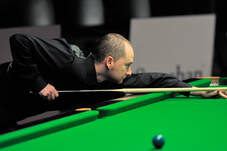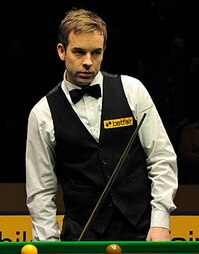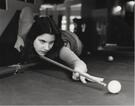 As Graeme Dott battled his way to the Snooker Grand Prix Final against Tom Ford, his opponent was several times credited with improvements in mentality thanks to working with a ‘mind coach’. Less spoken of is Graeme's own struggle against depression (BBC article linked behind the image: image courtesy Wikipedia). In the closing stages, Tom came back to square the match until Graeme took on a difficult shot, fluked two reds and landed plum on the black for the frame. Snooker is unique in many respects, not least because the table plays too. Other ball games rely on straightforward laws of physics - whether you’re winding from the tee across turf or kicking a football to a team-mate, the ground doesn’t play one off against the other like the green baize does. You’ll often hear commentators say that when the balls are with you, they’re with you, and when they’re against you, there’s nothing you can do. The table, as Steve Davis said, is very much a third player.  All ball games are psychological to some degree. But generally speaking, consistency comes to light in a singular performance. Not so in snooker. A player can turn from one frame of mind to the other in a matter of minutes, from elation to catastrophe in one foul swoop. Perhaps this is the reason it’s become so popular. If you can handle the silence, there’s never a dull moment. Ali Carter (meet him here) is another player with troubled stories to tell. Battling cancer and various mental frailties to reach his present form, he’s enjoying an increasing level of well-deserved popularity in the wake of fraught experiences. In the UK Championship final, he showed the merit of his talent. His personality exudes quiet warmth and backing him is joyful, like a real fire in winter. The thing that sets snooker apart is rooted in quantum principles. Mechanics come into it with angles and geometric analyses, but you don’t get down to a ball and work out the maths. I know how it feels when the object ball ‘talks’ to you, telling you exactly where to strike, while your job is to wait for that point of accuracy as you feather and make sure you cue the white to leave it in the right place for later. You judge an angle walking into the shot, but successful execution is as reliant on the ball telling you what to do as it is on your notion of where the pocket is. So-called ‘blind shots’ where you can’t even see the pocket show this communication system at work.  Attitude on the table also makes a big difference. Flukes happen in favour of one player or the other, but rare it is to get a fluke and land yourself with the next pot when you’re just not ‘into’ the game. You’re much more likely to end up snookered from a fluke if you’re feeling in any way fragile. This tendency for the table to intervene can change on a moment-by-moment basis, so whatever is going through a player’s mind is as important as what’s on the cloth at the time. That's me there, by the way, 38 years ago. Things were different then. Mental health is big potatoes right now. We hear many stories of vulnerability and valiant journeys to success across the whole range of popular sports - snooker is no league winner there. But in terms of its ruthlessness in forcing you to take account of quantum law, snooker is unparalleled. There are direct synergies between learning to play snooker and learning valuable tools in mentality. Like life, it’s tough - in getting proficient enough to beat the odds, you dedicate yourself to the task. But wherever you get to, it’s worth it, just as someone promised life would be.
0 Comments
Leave a Reply. |
AuthorKathy is the author of Quantumology. She met up with quantum mechanics in 1997, pledging allegiance to its sources thereafter. These are her personal thoughts and testimonies. Archives
April 2023
|
 RSS Feed
RSS Feed